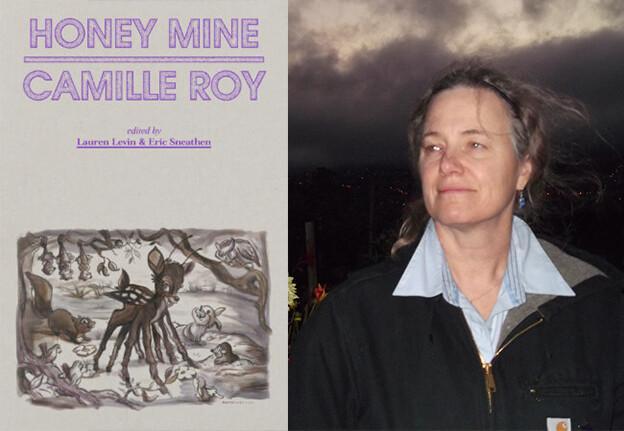| Trouble viewing this email? Read it online. |

| February 4, 2022 | Submit a Note |
 Kai Harris book launch of What the Fireflies Knew, February 3, 2022: Ezinne Ofoegbu (Educational Leadership), CiAuna Heard (Women's & Gender Studies), Kai Harris (English), Leticia Ridley (Theatre & Dance), and Melissa Brown (Communication).
I am glad to finally welcome everyone back to campus! What a difference it makes to be able to see and interact with you all in person rather than solely through a screen. I hope you are enjoying being back on campus as much as I am. I was recently asked to chair the search committee for our new Dean of the Library - something that I am very much looking forward to. Previously, our library director had the title of University Librarian. This title change conveys the central importance of our library to our academic mission and to the student experience at SCU. As the son of a university librarian, I have always had a special fondness and respect for all libraries, in general, and university libraries, in particular. I feel honored and thrilled to be part of this important search – may it signal ever greater collaboration with our wonderful library colleagues! At the risk of butchering the latin, in gaudio librorum, Daniel
Student Advisory Council
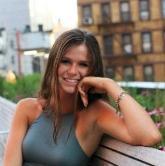
Caitlyn Burke is a senior Neuroscience and Public Health Science double major from Aurora, Colorado. She was inspired to be a part of the Student Advisory Council in order to help bridge the gap between university operations and student interests. During her time on the council, Caitlyn hopes to create a harmonious relationship between the university and the student body by manufacturing and carrying out projects that align with student concerns. A fun fact about Caitlyn is that she is currently training for her second half marathon which is in April! The Student Advisory Council was started during Fall 2021 and is made up of 10 students from across the College. They meet twice a quarter with Dean Press to discuss their aspirations, suggestions for new initiatives, and their responses to issues of the day.
Highlights

James Lai (Ethnic Studies) recently published his book Asian American Connective Action in the Age of Social Media (Temple University Press). The book illuminates how social media provides ethno-racial immigrant groups—especially those who cannot vote due to factors such as lack of citizenship and limited English proficiency—the ability to mobilize and connect around collective issues. Online spaces and discussion forums have encouraged many Asian Americans to participate in public policy debates and take action on social justice issues. This form of digital group activism serves as an adaptive political empowerment strategy for the fastest-growing and largest foreign-born population in America. Through the examination of case studies on contentious topics ranging from affirmative action debates to textbook controversies to emphasize the complexities, limitations, and challenges of connective action that is relevant to all racial groups, the findings demonstrate how associating online can facilitate and amplify traditional forms of political action.
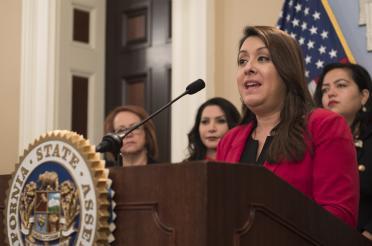
In January, Kristin Kusanovich (Theatre/Dance, Child Studies, tUrn) and twelve SCU undergraduate tUrn student researchers met with Jose Medina, Legislative Aid to CA Assemblymember Luz Rivas, District 39, to discuss a bill being introduced Feb 18, that would make the teaching of climate science mandatory in the K-6 curriculum and within the already existing science a-g graduation requirements of grades 7-12. At present, providing any climate science education in CA is optional. Representing 350 Silicon Valley's Legislative Team, Kusanovich was assigned to this bill because of her experience in state-level advocacy on matters of education, standards, curriculum, and credentials. Kusanovich articulated various recommendations to the bill, suggesting: 1) that the bill also emphasize the importance of an interdisciplinary, whole-school approach to climate science, especially in social studies where politics and economics tend to be situated, 2) that the bill not only mandates the teaching of the causes and effects of climate change, but also the teaching of solutions, and 3) how a climate justice framing, within mandated environmental education as a part of a student's science education could help right historical wrongs and prevent further inequities as mitigation and adaptation go forward. Additionally, she and Medina discussed climate disinformation as a perfect case study for teaching logical reasoning and how debunking it should be included in science education curricula. Image: CA Assemblymember Luz Rivas, author of the newest bill that would mandate climate change education in CA, shown here supporting the LAUSD teacher strike in 2019 (source: Luz Rivas' website).
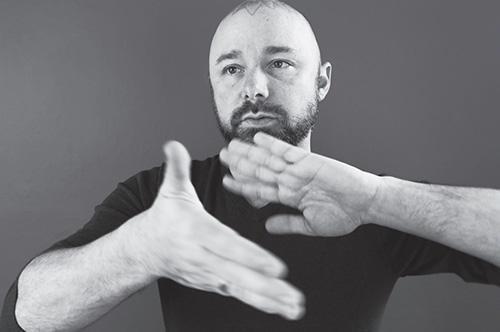
Miah Jeffra (English) presented on genre hybridity in fiction/nonfiction and the nature of memory as part of Central Washington University's Lion Rock Visiting Writer Series, followed by a craft talk and workshop for current students, Tuesday, January 25th and Wednesday, January 26th.
Image: Cover of Honey Mine (Left); Photo of Camille Roy (right) by Angela Romagnoli. Robin Tremblay-McGaw's (English) review of Bay Area New Narrative writer Camille Roy's Honey Mine from Nightboat Books appears in Jacket2. Honey Mine is an archive of feeling and experience; despite Roy’s assertion that she’s never written a coming-out story, Honey Mine offers its readers a sweet entanglement of story, essay, and poetry that traces Camille’s collision with and discovery of the worlds around her — from the Southside of Chicago to a Rocky Mountain mining town where Mina Loy is in residence, to a massage parlor in Michigan, then to San Francisco. Roy’s writing goes where mainstream fiction cannot: “the well-modulated distance of mainstream fiction not only distances social conflict, it also doesn’t represent lesbian relationships very well” (241).
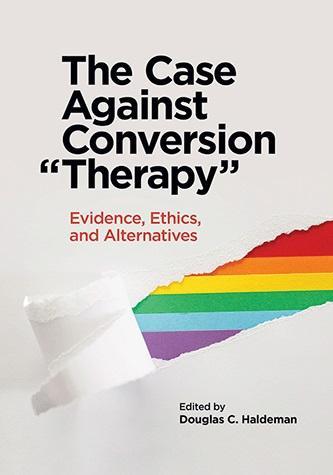
Tom Plante (Psychology) published a book chapter, "The role of religion in sexual orientation change efforts and gender identity change," in The Case Against Conversion “Therapy”: Evidence, Ethics, and Alternatives, edited by Douglas C. Haldeman. Most religious traditions offer extensive commentary on sexual ethics and expected behavior. Religious communities that lean more conservative often are more prescriptive and restrictive about sexuality while those that lean towards liberalism usually are more open and embracing of sexual diversity. Religious institutions and clerics are rather influential in our culture and often have a great deal to say about what is and what is not, from their point of view, appropriate sexual expression, behavior, and identity. This chapter offers an overview of some of the most common religious perspectives on sexual orientation and gender identity. The chapter also highlights ways that health and mental health professionals might be able to work productively and collaboratively with religious institutions and their leaders to best serve their diverse clients and patients, whom they aim to help and support, with respect, compassion, acceptance, and good ethics.

Image: Sympathy cards (top) and aggregated faces (bottom) that were selected as most resembling a compassionate response for U.S. Americans (on the left) and for Germans (on the right). Birgit Koopmann-Holm (Psychology) published an article "What constitutes a compassionate response? The important role of culture," in the journal Emotion with co-authors Katy Bruchmann (Psychology), Magdalena Fuchs (undergraduate from the University of Heidelberg, Germany), and Megan Pearson '17 (Psychology, Political Science). In their paper, they demonstrate that even people from two Western cultural contexts (the U.S. and Germany) differ in what kind of response they consider to be compassionate. While people in the U.S. consider responses that focus on the positive (e.g., sympathy cards that emphasize comforting memories, faces with a slight smile) as more compassionate compared to Germans, Germans consider responses that focus on the negative (e.g., sympathy cards that mention emotional pain, faces that mirror distress) as more compassionate compared to U.S. Americans. In their article, they show that these cultural differences can be explained by different attitudes towards negative emotions. In the U.S., people often want to avoid feeling negative, whereas people in Germany and other parts of Europe tend to be more accepting of negative emotions. This work has important implications for grief and trauma counseling in different cultural contexts.
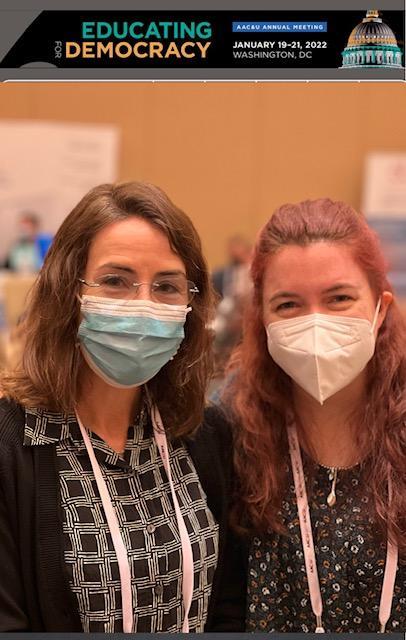
From January 20-24, Theresa Conefrey (English) participated in both in-person and virtual sessions of the American Association of Colleges and Universities Annual Meeting in Washington, DC. Her live presentation “Educating for democracy in undergraduate STEM programs” was delivered with Davida Smyth (Texas A&M). Her virtual presentations were part of The Forum on Open Learning and ePortfolios. "Tell me your story: Reflection, compassion, ethics, and social justice in ePortfolio practices," was presented with Tracy Penny Light (St. George’s University), Candyce Reynolds (Boise State University) and Sonja Taylor (Portland State University), and "Meet the principles: AAEEBL's Task Force on digital ethics in ePortfolios" was presented with Morgan Gresham (University of South Florida), Kristina Hoeppner (Catalyst, New Zealand), and Peter McLellan (Oxford College). Image: Theresa Conefrey and Davida Smyth.
College of Arts and Sciences Calendar
|
| College of Arts and Sciences |
Questions? Contact Sandy Boyer |
